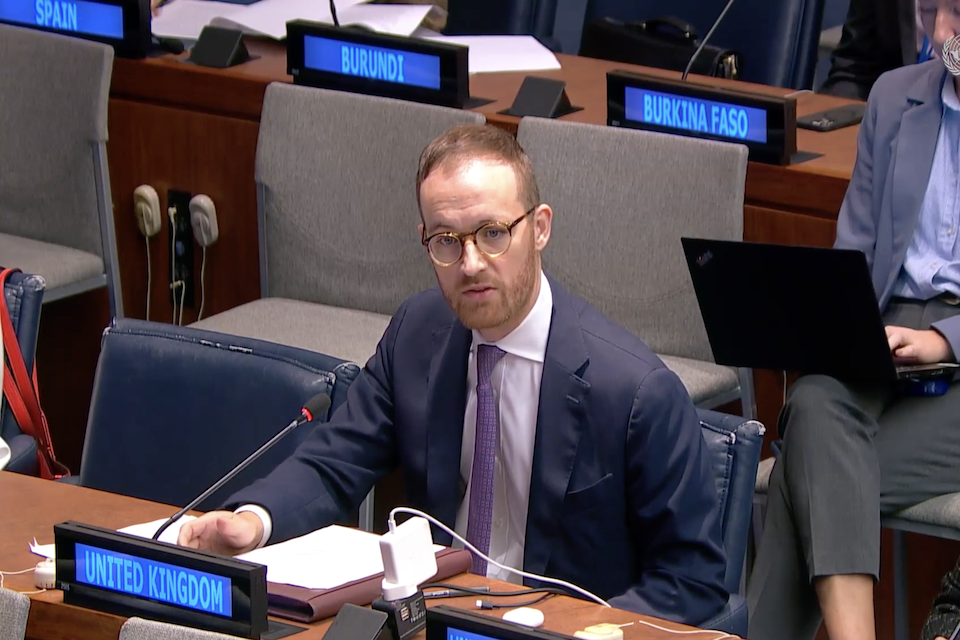The UK remains committed to upholding self-determination and responsibilities in Overseas Territories: UK statement at UN Fourth Committee
UK statement delivered by Mungo Woodifield, UK Spokesperson to the UN, at the UN Fourth Committee.

Thank you, Chair.
Chair, let me start by reiterating that the UK has a modern relationship with all of its Overseas Territories based on partnership; on shared values; and on the right of the people of each Territory to choose to remain British or not.
The UK Overseas Territories have a large measure of internal self-government, subject only to the UK retaining powers to carry out its obligations under international law.
We have a close bilateral relationship with each Territory, but the UK and Overseas Territory Governments also hold a Joint Ministerial Council each year to monitor and drive forward collective priorities for action in the spirit of partnership.
We are committed to supporting the Territories on their priorities including environmental protection and to carrying out our constitutional responsibilities, including ensuring security. Across the Territories, we provide financial and practical support to build local capacity and resilience and have projects underway to build new infrastructure, including a new hospital, ports and much more.
Mr Chair, I would like to address a couple of specific points relating to two of the UK’s Overseas Territories.
Firstly, Gibraltar. In the coming days, we anticipate that the Committee will hear directly from the Chief Minister of Gibraltar as the elected representative of its people. We welcome their participation and restate that the UK’s longstanding commitment to the people of Gibraltar remains unchanged.
The UK will not enter into arrangements under which the people of Gibraltar would pass under the sovereignty of another state against their freely and democratically expressed wishes.
The United Kingdom also reaffirms that it will not enter into a process of sovereignty negotiations with which Gibraltar is not content.
Following the UK’s departure from the European Union, the UK Government, together with the Government of Gibraltar and the Government of Spain, agreed to a Political Framework on how a future agreement between the UK and EU in respect of Gibraltar would function in the interests of all parties.
These negotiations began in October 2021 and the UK, working side-by-side with the Government of Gibraltar, is committed to concluding a UK-EU treaty as soon as possible.
Mr Chair, the second specific issue I wish to address is the Falkland Islands.
Let me reiterate that the UK has no doubt about its sovereignty over both the Falkland Islands, and South Georgia and the South Sandwich Islands, and their surrounding maritime areas. Nor do we have any doubt about the Falkland Islanders’ right to self-determination. This is enshrined in the UN Charter and in Article One of both of the two UN covenants on human rights, by virtue of which they freely determine their political status and freely pursue their economic, social and cultural development.
In the 2013 referendum, which was conducted in line with international standards and was observed by independent, international observers, 99.8 per cent of those who voted wanted to maintain their current status as a Territory of the United Kingdom. This result sent a clear message of self-determination, and that the people of the Islands do not want dialogue on sovereignty.
These wishes – expressed freely – should be respected.
The people of the Falkland Islands are an established and diverse community, with families being able to trace their South Atlantic ancestry back ten generations, and over 60 different nationalities are represented across the population.
The Falkland Islanders remain resilient in the face of harassment from Argentina - they are looking to a future in which their young people can freely travel the globe to play sports without fear of backlash from Argentina; in which they can share their wealth of knowledge on environmental protections with international partners; and importantly, a future in which they can have a peaceful and cooperative relationship with their neighbours, free from hostility.
The UK continues to hope for a stronger, more productive relationship with Argentina, including in relation to the Falkland Islands. We believe this is in everybody’s interest and stand ready to take that forward, but not at the expense of the Falkland Islanders right to determine their own future. This means that there can be no dialogue on sovereignty unless the Falkland Islands so wish.
Chair, in conclusion, the UK remains committed to respecting and defending the right of the people of each Territory to determine their own future, in line with the UN Charter.
Let me also reassure you that the UK will continue to carry out our responsibilities as part of our modern relationship with each of the territories.
Thank you, Chair.